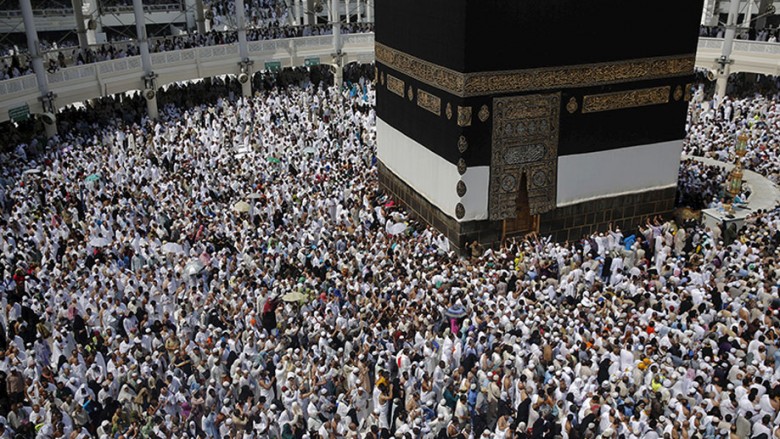Muslim clerics must reject notions of non-Muslim inferiority
By Raza Ahmad Rumi | December 17, 2015, 6:58 EST
 Muslim pilgrims pray around the holy Ka’bah at the Grand Mosque ahead of the annual hajj pilgrimage in Mecca on Sept. 21, 2015. (REUTERS/Ahmad Masood, RNS)
Muslim pilgrims pray around the holy Ka’bah at the Grand Mosque ahead of the annual hajj pilgrimage in Mecca on Sept. 21, 2015. (REUTERS/Ahmad Masood, RNS) (RNS) — After the Paris attacks and mass shooting at San Bernardino, the debates on Islam have predictably intensified, feeding hysteria and Islamophobia.
While the hate rhetoric is alarming, it is important to note that aspects of Muslim theology and jurisprudence constructed during the early years of the Islamic empire influence the wider belief system of extremists. And while most Muslims are not radicalized, they are exposed to extremist views that center on the radical notion of Islamic totalitarianism.
Javed Ahmad Ghamidi, Pakistan’s foremost progressive scholar of Islam, recently stated that the root cause of terror being committed in the name of Islam was “the religious thought” — both preached in madrassas (religious seminaries) and “propagated through political movements.” Ghamidi’s candid views were not acceptable to the clerics, who found ample space in Pakistan’s public spheres. In 2009 he was threatened and his associates attacked, and since 2010 he has been living in Malaysia.
As per Ghamidi’s analysis, a few doctrines shape the extremist mindset:
— Polytheism, atheism and apostasy, committed anywhere in the world, are punishable by death. And through this, the clergy — and the militias they inspire — appropriate the power to punish. This is how the Islamic State terror group sources “legitimacy” to reshape its dominion, and by any means.
— Only Muslims have the right to govern, and every non-Muslim government is illegitimate. Non-Muslim inferiority is intrinsically linked to the idea of Muslim supremacy and consequently the need to subjugate. Islamic extremists hold the overthrow of non-Muslim governments to be necessary and permissible whenever possible.
— Muslims across the globe should be under the rule of a single Islamic government — the Khilafat, or caliphate. This notion occupies a central place in the radical mindset. Even today’s Muslim nation-states, numbering 56, have no legitimacy in the radicals’ eyes.
For all the Islamophobia poisoning the well, one cannot deny the swell of seminaries and clerics preaching such ideas today. The genesis of these concepts is linked to the expansion of the Arab Empire from the seventh century onward. The experiences of the Prophet Muhammad in defending his movement, and a few related Quranic verses, are cited as the rationale for such supremacist discourses. Over time, however, Muslims have favored a more nuanced, contextual interpretation of both the Quran and their prophet’s life. The popular mood currently, however, favors a cherry-picked and literal reading, divorced from time and place, and it is used to legitimize violence.
My own country, Pakistan, is a case study in the mal-effects that these ill winds generate.
In the wake of jihad in support of the Afghan resistance against the Soviet Union, radical ideologies mushroomed. Transnational movements and groups such as al-Qaida, and now ISIS, mastered the employment of violence in the garb of Muslim resistance. Ironically, this has served only to endanger the lives and identities of Muslims globally.
Ghamidi believes that without counternarratives, the situation will worsen — not just in the Middle East, but wherever Muslims live and practice their faith. However, it remains to be seen how such measures can be taken when governments of the Gulf countries, especially Saudi Arabia, actively preach and export the same literalist doctrines –Wahhabism and Salafism — across the world. In a recent Freedom House report, Saudi textbooks were analyzed. Among other dangerous narratives, the textbooks taught young Saudis to “condemn and denigrate the majority of Sunni Muslims who do not follow the Wahhabi understanding of Islam, and call them deviants and descendants of polytheists.” Such ideas underlie ISIS’ vicious targeting of Muslims — who account for over 90 percet of those they have killed.
The official textbooks, written under the tutelage of a theocratic monarchy, also say that Shiite and Sufi Muslims are heretical and that these groups should be seen as polytheists. Similarly, Muslims must hate Christians, Jews and other “unbelievers” — and that the “Jews and the Christians are enemies of the (Muslim) believers.” Mainstream schools in Saudi Arabia and elsewhere teach that the “spread of Islam through jihad is a religious duty.” During the 1980s, such ideas were also imparted to Pakistani and Afghan children, and some of these textbooks continue to be used. Ironically, the University of Nebraska produced and supplied these textbooks, to further the cause of jihad against the Soviets.
Colonial scars, alongside fresh, neo-colonial wounds, have wreaked havoc in the Middle East. Today, Syria, Iraq and Libya are states only in name. Twentieth-century Middle Eastern states were artificially carved and ruled by dictatorships that prevented the emergence of democratic institutions — and in such a social and political landscape, the simplicity of the extremists’ message became a panacea. And yet for Muslim leaders, scholars and intellectuals, this can present no opt-out clause — their focus must remain on challenging popular narratives and conspiracy theories that pollute the minds of millions. That ISIS does not represent the Muslim corpus is a truism. However, it must also be accepted that popular discourses in Muslim societies often encourage hate.
Muslim leaders must reform religious and jurisprudential doctrines regarding non-Muslim inferiority, the global caliphate and capital punishments, and recognize that this will better equip them to deal with the complexities characterizing the world today. Blaming others for persistent problems is an easy path to take — but that will serve only to entrench Muslims deeper in the quagmire.
Raza Ahmad Rumi is a Pakistani policy analyst and journalist who is a scholar in residence at Ithaca College in New York.











